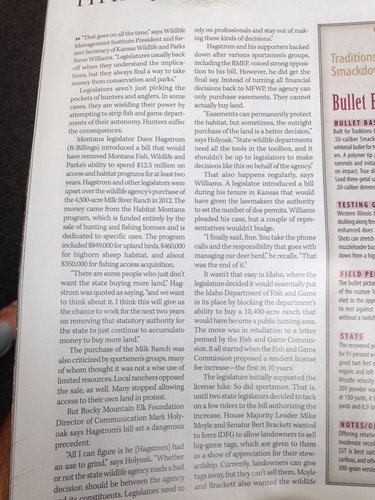dannyb278
Active member
- Joined
- Aug 4, 2015
- Messages
- 575
Just finished listening to another great podcast. By the end of Randy's podcasts I'm ready to grab my torch and pitchfork and march on Congress. A couple comments on this weeks podcast:
1. Expanding the Pittman Robertson act to other "non-consumptinve" users. Outside Magazine recently posted an article about mountain bike access to Wilderness Areas. It turned into a very vigorous debate for both sides, with comments flying left and right. When I suggested that bikers put their money where their mouth is and push their representitives for a extra 11 percent tax on all their equipment, much like hunters have done since the 1940s.....it was nothing but crickets. Not one comment for or against. People seem to really not care what is outside of their 2 foot wide riding trail, as long as they have a trail to ride.
2. This might have been one of my favorite podcasts so far, but the last few minutes of it kind of left a bad taste in my craw. Mckean and Hal need to put their money where there mouth is as well. I believe everything they said they stood for is honest, but both of these guys bemoaned the very state of Media that they themselves encourage. Have you opened Outdoor LIfe recently? All it is is the same gear reviews, product placement, and tactics fluff pieces that we've all read a million times before. They have become the equivalent of the monthly "how to get 6 pack abs fast" articles that are on the cover of every mens health magazine, every month. Total fluff and very little substance. I don't need more reviews on gear I'm never going to buy. What I need as a reader is actual substance. So I hope those 2 actually took away something from the podcast as well, because otherwise the media is no better than politicians, saying one thing and doing another. That's my rant for the day I guess.
1. Expanding the Pittman Robertson act to other "non-consumptinve" users. Outside Magazine recently posted an article about mountain bike access to Wilderness Areas. It turned into a very vigorous debate for both sides, with comments flying left and right. When I suggested that bikers put their money where their mouth is and push their representitives for a extra 11 percent tax on all their equipment, much like hunters have done since the 1940s.....it was nothing but crickets. Not one comment for or against. People seem to really not care what is outside of their 2 foot wide riding trail, as long as they have a trail to ride.
2. This might have been one of my favorite podcasts so far, but the last few minutes of it kind of left a bad taste in my craw. Mckean and Hal need to put their money where there mouth is as well. I believe everything they said they stood for is honest, but both of these guys bemoaned the very state of Media that they themselves encourage. Have you opened Outdoor LIfe recently? All it is is the same gear reviews, product placement, and tactics fluff pieces that we've all read a million times before. They have become the equivalent of the monthly "how to get 6 pack abs fast" articles that are on the cover of every mens health magazine, every month. Total fluff and very little substance. I don't need more reviews on gear I'm never going to buy. What I need as a reader is actual substance. So I hope those 2 actually took away something from the podcast as well, because otherwise the media is no better than politicians, saying one thing and doing another. That's my rant for the day I guess.
Last edited:






